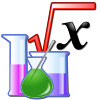- Natural science
-
The natural sciences are branches of science that seek to elucidate the rules that govern the natural world by using empirical and scientific methods. The term "natural science" is used to distinguish the subject matter from the social sciences, which apply the scientific method to study human behavior and social patterns; the humanities, which use a critical or analytical approach to study the human condition; and the formal sciences such as mathematics and logic, which use an a priori, as opposed to factual methodology to study formal systems.
Contents
Overview
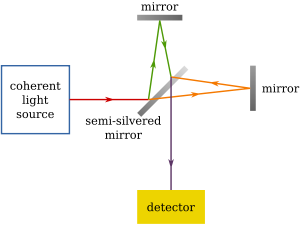 The Michelson–Morley experiment was used to disprove that light propagated through a luminiferous aether. This 19th century concept was then superseded by Albert Einstein's special theory of relativity.
The Michelson–Morley experiment was used to disprove that light propagated through a luminiferous aether. This 19th century concept was then superseded by Albert Einstein's special theory of relativity.
Natural sciences are the basis for applied sciences. Together, the natural and applied sciences are distinguished from the social sciences on the one hand, and the humanities on the other. Though mathematics, statistics, and computer science are not considered natural sciences, for instance, they provide many tools and frameworks used within the natural sciences.
Alongside this traditional usage, the phrase natural sciences is also sometimes used more narrowly to refer to natural history. In this sense "natural sciences" may refer to the biology and perhaps also the earth sciences, as distinguished from the physical sciences, including astronomy, physics, and chemistry.
Within the natural sciences, the term hard science is sometimes used to describe those subfields which some people view as relying on experimental, quantifiable data or the scientific method and focus on accuracy and objectivity. These usually include physics, chemistry and biology. By contrast, soft science is often used to describe the scientific fields that are more reliant on qualitative research, including the social sciences.
History
In ancient and medieval times, the objective study of nature was known as natural philosophy. In late medieval and early modern times, a philosophical interpretation of nature was gradually replaced by a scientific approach using inductive methodology. The work of Sir Francis Bacon popularized this approach, thereby helping to forge the scientific revolution.
By the 19th century, the study of science had come into the purview of professionals and institutions. In so doing, it gradually acquired the more modern name of natural science. The term scientist was coined by William Whewell in an 1834 review of Mary Somerville's On the Connexion of the Sciences. But the word did not enter general use until nearly the end of the same century.
According to a famous 1923 textbook Thermodynamics — and the Free Energy of Chemical Substances by the American chemist Gilbert N. Lewis and the American physical chemist Merle Randall, the natural sciences contain three great branches:
Aside from the logical and mathematical sciences, there are three great branches of natural science which stand apart by reason of the variety of far reaching deductions drawn from a small number of primary postulates — they are mechanics, electrodynamics, and thermodynamics.
Today, natural sciences are more commonly divided into life sciences, such as botany and zoology; and physical sciences, which include physics, chemistry, geology and astronomy.
Branches of natural science
Astronomy
Main article: Astronomy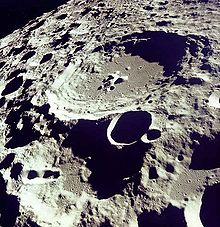 Space missions have been used to image distant locations within the Solar System, such as this Apollo 11 view of Daedalus crater on the far side of the Moon.
Space missions have been used to image distant locations within the Solar System, such as this Apollo 11 view of Daedalus crater on the far side of the Moon.
This discipline is the science of celestial objects and phenomena that originate outside the Earth's atmosphere. It is concerned with the evolution, physics, chemistry, meteorology, and motion of celestial objects, as well as the formation and development of the universe.
Astronomy includes the examination, study and modeling of stars, planets, comets, galaxies and the cosmos. Most of the information used by astronomers is gathered by remote observation, although some laboratory reproduction of celestial phenomenon has been performed (such as the molecular chemistry of the interstellar medium).
While the origins of the study of celestial features and phenomenon can be traced back to antiquity, the scientific methodology of this field began to develop in the middle of the 17th century. A key factor was Galileo's introduction of the telescope to examine the night sky in more detail.
The mathematical treatment of astronomy began with Newton's development of celestial mechanics and the laws of gravitation, although it was triggered by earlier work of astronomers such as Kepler. By the 19th century, astronomy had developed into a formal science, with the introduction of instruments such as the spectroscope and photography, along with much-improved telescopes and the creation of professional observatories.
Biology
Main article: Biology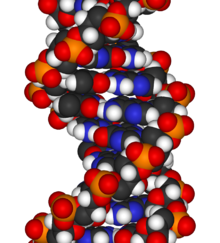 A fragment of DNA, the chemical sequence that contains genetic instructions for the development and functioning of living organisms
A fragment of DNA, the chemical sequence that contains genetic instructions for the development and functioning of living organisms
This field encompasses a set of disciplines that examines phenomena related to living organisms. The scale of study can range from sub-component biophysics up to complex ecologies. Biology is concerned with the characteristics, classification and behaviors of organisms, as well as how species were formed and their interactions with each other and the environment.
The biological fields of botany, zoology, and medicine date back to early periods of civilization, while microbiology was introduced in the 17th century with the invention of the microscope. However, it was not until the 19th century that biology became a unified science. Once scientists discovered commonalities between all living things, it was decided they were best studied as a whole.
Some key developments in biology were the discovery of genetics; Darwin's theory of evolution through natural selection; the germ theory of disease and the application of the techniques of chemistry and physics at the level of the cell or organic molecule.
Modern biology is divided into subdisciplines by the type of organism and by the scale being studied. Molecular biology is the study of the fundamental chemistry of life, while cellular biology is the examination of the cell; the basic building block of all life. At a higher level, physiology looks at the internal structure of organism, while ecology looks at how various organisms interrelate.
Chemistry
Main article: Chemistry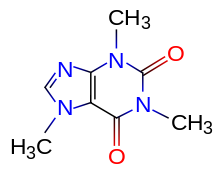 This structural formula for molecule caffeine shows a graphical representation of how the atoms are arranged.
This structural formula for molecule caffeine shows a graphical representation of how the atoms are arranged.
Constituting the scientific study of matter at the atomic and molecular scale, chemistry deals primarily with collections of atoms, such as gases, molecules, crystals, and metals. The composition, statistical properties, transformations and reactions of these materials are studied. Chemistry also involves understanding the properties and interactions of individual atoms for use in larger-scale applications.
Most chemical processes can be studied directly in a laboratory, using a series of (often well-tested) techniques for manipulating materials, as well as an understanding of the underlying processes. Chemistry is often called "the central science" because of its role in connecting the other natural sciences.
Early experiments in chemistry had their roots in the system of Alchemy, a set of beliefs combining mysticism with physical experiments. The science of chemistry began to develop with the work of Robert Boyle, the discoverer of gas, and Antoine Lavoisier, who developed the theory of the Conservation of mass.
The discovery of the chemical elements and the concept of Atomic Theory began to systematize this science, and researchers developed a fundamental understanding of states of matter, ions, chemical bonds and chemical reactions. The success of this science led to a complementary chemical industry that now plays a significant role in the world economy.
Earth science
Main article: Earth scienceEarth science (also known as geoscience), is an all-embracing term for the sciences related to the planet Earth, including geology, geophysics, hydrology, meteorology, physical geography, oceanography, and soil science.
Although mining and precious stones have been human interests throughout the history of civilization, the development of the related sciences of economic geology and mineralogy did not occur until the 18th century. The study of the earth, particularly palaeontology, blossomed in the 19th century. The growth of other disciplines, such as geophysics, in the 20th century led to the development of the theory of plate tectonics in the 1960s, which has had a similar effect on the Earth sciences as the theory of evolution had on biology. Earth sciences today are closely linked to climate research and the petroleum and mineral exploration industries.
Physics
Main article: Physics The orbitals of the hydrogen atom are descriptions of the probability distributions of an electron bound to a proton. Their mathematical descriptions are standard problems in quantum mechanics, an important branch of physics.
The orbitals of the hydrogen atom are descriptions of the probability distributions of an electron bound to a proton. Their mathematical descriptions are standard problems in quantum mechanics, an important branch of physics.
Physics embodies the study of the fundamental constituents of the universe, the forces and interactions they exert on one another, and the results produced by these interactions. In general, physics is regarded as the fundamental science, because all other natural sciences use and obey the principles and laws set down by the field. Physics relies heavily on mathematics as the logical framework for formulation and quantification of principles.
The study of the principles of the universe has a long history and largely derives from direct observation and experimentation. The formulation of theories about the governing laws of the universe has been central to the study of physics from very early on, with philosophy gradually yielding to systematic, quantitative experimental testing and observation as the source of verification. Key historical developments in physics include Isaac Newton's theory of universal gravitation and classical mechanics, an understanding of electricity and its relation to magnetism, Einstein's theories of special and general relativity, the development of thermodynamics, and the quantum mechanical model of atomic and subatomic physics The field of physics is extremely broad, and can include such diverse studies as quantum mechanics and theoretical physics, applied physics and optics. Modern physics is becoming increasingly specialized, where researchers tend to focus on a particular area rather than being "universalists" like Isaac Newton, Albert Einstein and Lev Landau, who worked in multiple areas.
Atmospheric science
Main article: Atmospheric sciencesThough sometimes considered in conjunction with the earth sciences, due to the independent development of its concepts, techniques and practices and also the fact of it having a wide range of sub disciplines under its wing, the atmospheric science is also considered a separate branch of natural science. This field studies the characteristics of different layers of the atmosphere from near ground level to the edge of the space. The timescale of study also varies from days to centuries. Sometimes the field also includes the study of climatic patterns on planets other than earth.
Oceanography
Main article: OceanographyThe serious study of oceans began in the early to mid 1900s. As a field of natural science, it is relatively young but stand-alone programs offer specializations in the subject. Though some controversies remain as to the categorization of the field under earth sciences, interdisciplinary sciences or as a separate field in its own right, most modern workers in the field agree that it has matured to a state that it has its own paradigms and practices. As such a big family of related studies spanning every aspect of the oceans is now classified under this field.
Materials science
Main article: Materials scienceOriginally developed through the field of metallurgy, the study of the properties of materials has now expanded into many materials other than metals. The field covers the chemistry, physics and engineering applications of materials including metals, ceramics, artificial polymers, and many others.
Interdisciplinary studies
The distinctions between the natural science disciplines are not always sharp, and they share a number of cross-discipline fields. Physics plays a significant role in the other natural sciences, as represented by astrophysics, geophysics, chemical physics and biophysics. Likewise chemistry is represented by such fields as biochemistry, geochemistry and astrochemistry.
A particular example of a scientific discipline that draws upon multiple natural sciences is environmental science. This field studies the interactions of physical, chemical and biological components of the environment, with a particular regard to the effect of human activities and the impact on biodiversity and sustainability. This science also draws upon expertise from other fields such as economics, law and social sciences.
A comparable discipline is oceanography, as it draws upon a similar breadth of scientific disciplines. Oceanography is sub-categorized into more specialized cross-disciplines, such as physical oceanography and marine biology. As the marine ecosystem is very large and diverse, marine biology is further divided into many subfields, including specializations in particular species.
There are also a subset of cross-disciplinary fields which, by the nature of the problems that they address, have strong currents that run counter to specialization. Put another way: In some fields of integrative application, specialists in more than one field are a key part of most dialog. Such integrative fields, for example, include nanoscience, astrobiology, and complex system informatics.
See also
- Empiricism
- List of academic disciplines
- Nature
- Natural history
- Natural philosophy, the precursor of the physical sciences.
- Science
- Fields of science
- Natural sciences
- Behavioral sciences
- Social sciences
- History of science
- History of technology
- Fields of science
- Science wars
References
- Defining Natural Sciences Ledoux,S. F., 2002: Defining Natural Sciences, Behaviorology Today, 5(1), 34-36.
External links
- The History of Recent Science and Technology
- Natural Sciences Information on the Natural Sciences degree programme at Durham University.
- Natural Sciences Contains updated information on research in the Natural Sciences including biology, geography and the applied life and earth sciences.
- Natural Sciences Information on the Natural Sciences degree programme at the University of Bath which includes the Biological Sciences, Chemistry, Pharmacology, Physics and Environmental Studies.
- Reviews of Books About Natural Science This site contains over 50 previously published reviews of books about natural science, plus selected essays on timely topics in natural science.
- Scientific Grant Awards Database Contains details of over 2,000,000 scientific research projects conducted over the past 25 years.
- Natural Sciences Tripos Provides information on the framework within which most of the natural science is taught at the University of Cambridge.
Natural science Physical science · Space science · Earth science · Life science
Categories:- Natural sciences
Wikimedia Foundation. 2010.

